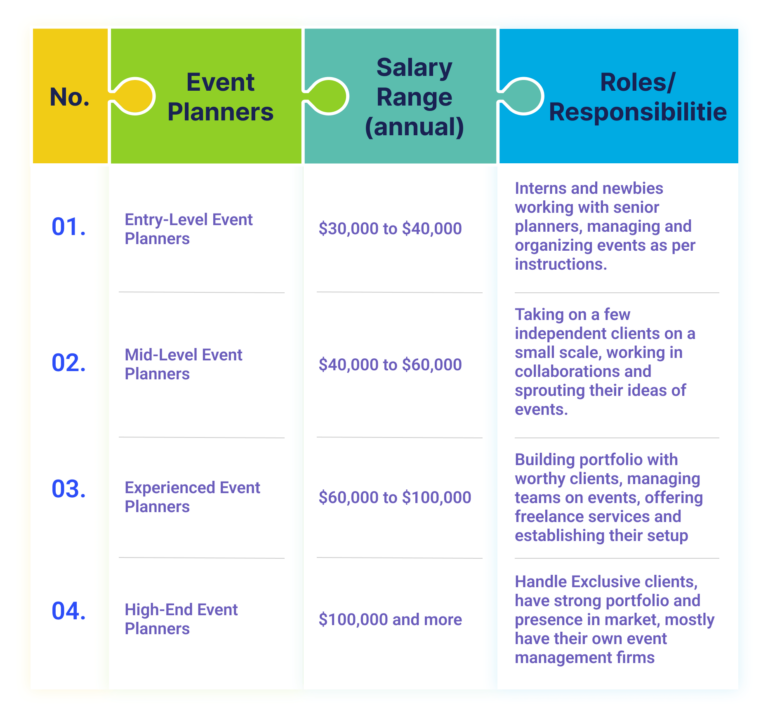Event management is a dynamic and exciting field, but one burning question that often arises is, “How much do event managers make?” Understanding the earning potential in this industry is crucial for aspiring professionals and those looking to advance their careers. In this blog, we will delve into the various factors that influence an event manager’s salary, including experience, location, specialization, and industry trends. By unveiling the truth behind event managers’ salaries, we aim to provide valuable insights for individuals navigating the diverse landscape of event planning. Stay tuned to discover the financial rewards that come with orchestrating unforgettable experiences!
Introduction: Exploring the World of Event Management
Event management is a dynamic and exciting field that involves planning, organizing, and executing events of all scales to perfection. From corporate conferences to weddings to music festivals, event managers play a crucial role in ensuring that every detail is meticulously taken care of, making the event a grand success.
The Role of Event Managers
Event managers wear multiple hats, acting as project managers, negotiators, coordinators, and troubleshooters. They work tirelessly behind the scenes to create seamless experiences for attendees and clients alike. Their expertise lies in budgeting, scheduling, marketing, and logistics, making them essential players in the event industry.
Skills Required
To excel in event management, professionals need a diverse skill set. Strong communication skills, creativity, attention to detail, and the ability to work under pressure are paramount. Being adaptable, proactive, and team-oriented are also crucial traits for success in this fast-paced industry.

Educational Background and Experience Required
Event managers play a crucial role in organizing and overseeing various events, ranging from corporate conferences to music festivals. To excel in this field and earn a lucrative income, certain educational qualifications and experience levels are typically required.
Educational Qualifications
Most event management positions require a bachelor’s degree in hospitality management, marketing, business administration, or a related field. A solid educational foundation equips professionals with essential skills such as budget management, project planning, and client communication.
Relevant Experience
Prior experience in event planning, marketing, or public relations is highly valued in the industry. Entry-level roles may require internships or part-time event coordination experience to understand the nuances of managing diverse events successfully.
- Experience in negotiating contracts with vendors and suppliers is a valuable asset.
- Strong time management skills and the ability to multitask effectively are essential for handling complex events.
Factors Affecting Event Managers’ Salaries
Event managers’ salaries can vary based on several key factors. Understanding these factors is essential for professionals in this field to negotiate fair compensation packages.
1. Experience Level
Event managers with more experience typically command higher salaries. Experienced professionals bring a wealth of knowledge and skills to the table, making them more valuable to employers.
Additionally, seasoned event managers may have a larger network of contacts, which can lead to more lucrative opportunities.
2. Geographic Location
The location of the event management role also plays a significant role in determining salary levels. Cities with a higher cost of living and more significant demand for event management services typically offer higher salaries.
For example, event managers working in major metropolitan areas like New York or Los Angeles may earn more than those in smaller cities or rural areas.
3. Education and Qualifications
Event managers with advanced degrees or industry certifications often command higher salaries. Employers value candidates who have invested in their education and training, as it demonstrates a commitment to professional growth and expertise.
Continuing education and staying current with industry trends can also positively impact an event manager’s earning potential.
Typical Salary Range for Event Managers
Event managers play a crucial role in organizing and executing successful events. When it comes to compensation, the typical salary range for event managers can vary based on factors such as experience, location, and the type of events they manage. As of the latest data in 2021, the average annual salary for event managers in the United States is around $55,000 to $85,000.
Factors Influencing Salary
The salary range for event managers can be impacted by several key factors:
- Experience: Event managers with more years of experience generally command higher salaries.
- Location: Salaries can vary significantly based on the cost of living in different regions.
- Type of Events: Managing corporate events often pays more than social or non-profit events.
Salary Growth Potential
Event management is a field with opportunities for salary growth. As event managers gain more experience, certifications, and successful event executions under their belts, they are likely to see an increase in their earning potential. With the demand for well-organized events on the rise, event managers with a track record of success can negotiate higher salaries.
Opportunities for Growth and Advancement
Event management is a dynamic field that offers ample opportunities for growth and advancement, both professionally and financially. With the increasing demand for well-organized and successful events, event managers are presented with a host of avenues to expand their careers and earnings.
Professional Development
Event managers can enhance their skills and knowledge through continued education and certifications. Pursuing further studies in event management or related fields can open doors to higher-paying positions and leadership roles within the industry. Attending workshops, seminars, and conferences can also provide valuable networking opportunities.
Moreover, gaining experience in managing a variety of events, from small corporate meetings to large-scale conferences and festivals, can help event managers establish themselves as experts in the field.
Specialization and Niche Markets
Event managers can capitalize on the growing trend of specialization within the industry. By focusing on niche markets such as destination weddings, corporate retreats, or eco-friendly events, professionals can set themselves apart and attract high-paying clients seeking specialized services.
Developing expertise in emerging event technologies and trends, such as virtual and hybrid events, can also position event managers as innovative leaders in the field.
Frequently Asked Questions
-
- What is the average salary of an event manager?
- The average salary of an event manager can vary depending on factors such as experience, location, type of events managed, and company size. However, in the United States, the average salary for an event manager is around $50,000 to $70,000 per year.
-
- Do event managers earn more in certain industries?
- Yes, event managers can earn more in certain industries such as corporate events, weddings, sports events, and large-scale conferences. The salaries may vary based on the demand for event management services in a particular industry.
-
- What factors can influence the salary of an event manager?
- Several factors can influence the salary of an event manager including experience, education, certifications, location, type of events managed, company size, and negotiation skills. Event managers with specialized skills or working in high-demand industries may command higher salaries.
-
- Are there opportunities for event managers to increase their income?
- Yes, event managers can increase their income by taking on larger and more complex events, gaining specialized certifications, networking with industry professionals, and continuously improving their skills. Advancement to senior event management roles or starting their event management business can also lead to higher earnings.
-
- What are some additional perks that event managers may receive?
- In addition to their base salary, event managers may receive perks such as bonuses for successful events, commissions for bringing in new clients or sponsors, opportunities for travel, flexible working arrangements, and access to exclusive events.
Unlocking the Enigma: Exploring Event Managers’ Salaries
After delving into the intricacies of how much event managers make, it’s clear that this field offers a wide range of earning potentials based on experience, location, and the type of events managed. The average salary for event managers falls around $50,000 to $80,000 per year, with opportunities for growth and advancement as they gain expertise.
Whether you are considering a career in event management or are already a seasoned professional, understanding the factors that influence compensation is crucial. By staying informed about industry trends, networking, and honing your skills, you can strive towards achieving a lucrative salary in this dynamic and rewarding profession.
Keep in mind that while financial rewards are essential, the intrinsic satisfaction of orchestrating successful events and creating memorable experiences for clients and attendees is priceless. With dedication and passion, event managers can carve out a fulfilling and prosperous career in this exciting industry.



